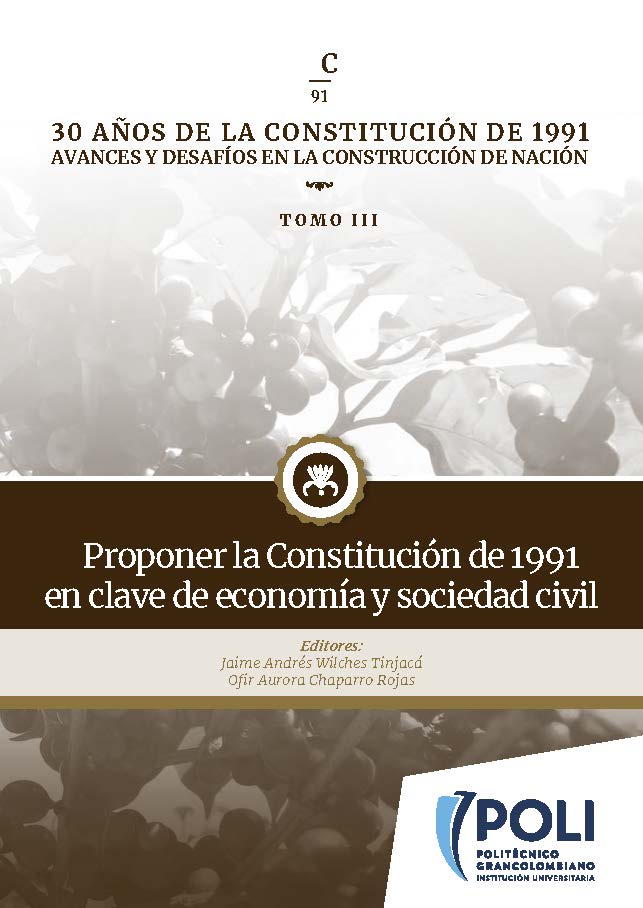Resumen
La Constitución Política de Colombia de 1991 trajo consigo una serie de transformaciones que pretendían fortalecer las características democráticas del Estado. Una de ellas es retratada por Andrés Ramírez Gallego (2007) quien, a través de un análisis de la incorporación de derechos étnicos, resalta la integración de los grupos indígenas en los marcos normativos como un mecanismo en contra de la marginalización y el desconocimiento. Más allá del esfuerzo en términos de inclusión, plasmado en la Constitución del 91, habría que preguntarse: ¿Son suficientes las medidas tomadas para pensarse como una nación que, al menos desde la ley, garantiza la igualdad de derechos entre seres humanos? El espejo que han brindado otros países de la región, como Bolivia y Ecuador, los cuales promulgaron una reformulación del Estado para entenderse como plurinacionales y profundizar, desde la heterogeneidad, la igualdad pretendida (Walsh, 2008), lleva a pensar que Colombia aún está lejos de la meta.
Referencias
Anthony, C. (2008). American Democratic Interventionism: Romancing the Iconic Woodrow Wilson. International Studies Perspectives, (9), 239-253.
Bajtín, M. (1981). The Dialogic Imagination: Four essays. University of Texas Press.
Calderon, F. y Castells, M. (2019). La nueva América Latina. Fondo de Cultura Económica.
Comisión Económica para América Latina y el Caribe (CEPAL). (2014). Los pueblos indígenas en América Latina: avances en el último decenio y retos pendientes para la garantía de sus derechos. Naciones Unidas.
Constitución Política de Colombia. (1991). Legis.
Cruz, E. (2012). Redefiniendo la nación: luchas indígenas y estado plurinacional en Ecuador (1990-2008). Nómadas. Revista Crítica de Ciencias
Sociales y Jurídicas, Especial: América Latina, 469-491.
Denevan, W. (1976). The Native Population of the Americans in 1492. University of Winsconsin Press.
Departamento Administrativo Nacional de Estadística (DANE). (1986). Censo de 1985. http://biblioteca.dane.gov.co/media/libros/LB_771_1985_V_5.PDF
Departamento Administrativo Nacional de Estadística (DANE). (2019). Población de Colombiba: resultados del censo nacional de población y vivienda 2018. https://www.dane.gov.co/: https://www.dane.gov.co/files/investigaciones/boletines/gruposetnicos/presentacion-grupos-etnicos-2019.pdf
Doty, R. (1996). Imperial Encounters: The Politics of Representation in North-South Relations. University Of Minnesota Press.
Green, D. y Denemark, R. (1999). Cycles of Liberalism in the Twentieth Century. Humboldt Journal of Social Relations, 25(1), 31-64.
Helleiner, E. (2006). Reinterpreting Bretton Woods: International Development and the Neglected Origins of Embedded Liberalism. Development and Change, 37(5), 943-967.
Huntington, S. (1996). The Clash of Civilizations and the Remaking of the World Order. Simon & Schuster.
Ikenberry, J. (1996). The Myth of Post-Cold War Chaos. Foreign Affairs, 75(3), 79-91.
Inayatullah, N. y Blaney, D. (2004). International Relations and the Problem of Difference. Routledge.
Johnson, C. (2004). Las amenazas del imperio. Militarismo, secretismo y el fin de la república. Crítica.
Jones, H. (2008). Crucible of Power. A History of American Foreign Relations from 1897. Rowman & Littlefield Publishers, Inc.
Latour, B. (2004). Whose Cosmos, Which Cosmopolitics? Comments on the Peace. Common Knowledge, 10(3), 450-462.
León-Manríquez, J. y Álvarez, L. (2014). Mao’s steps in Monroe’s backyard: towards a United States-China hegemonic struggle in Latin America? Revista Brasileira de Política Internacional, (57), 9-27.
Lewis, C. (2019). CEPAL and ISI: Reconsidering the Debates, Policies and Outcomes. Revista de Estudios Sociales, (68), 8-26.
Leyshon, A. y Tickell, A. (1994). Money order? The discursive construction of Bretton Woods and the making and breaking of regulatory space. Environment and Planning A, 26(12), 1861-1890.
Lodgaard, S. (2011). Nuclear Disarmament and Non-Proliferation. Towards a nuclear-weaponfree world? London: Routledge.
Martínez, R. y Soto, E. (2012). El Consenso de Washington: la instauración de las políticas neoliberales en América Latina. Política y cultura, (37), 35-64.
Nixson, F. (2016). Import Substituting Industrialisation (ISI): Can or should we divorce industralisation and trade strategies. En J. Weiss y M. Tribe, Routledge Handbook of Industry and Development (pp. 151-165). Routledge.
Nye, J. (2019). The rise and fall of American hegemony from Wilson to Trump. International Affairs, 95(1), 63-80.
Organización Internacional del Trabajo (OIT). (2014). Convenio Núm. 169 de la OIT sobre pueblos indígenas y tribales. https://www.ilo.org/wcmsp5/groups/public/---americas/---ro-lima/documents/publication/wcms_345065.pdf
Pfaff, W. (2000). Barbarian Sentiments: America in the New Century. Hill and Wang.
Pratt, M. (1991). Arts of the contact zone. Profession, 33-40.
Querejazu, A. (2016). Violencias encubiertas de la gobernanza global. Estudios Políticos, 49, 148-166.
Ramírez, A. (2007). La etno-Constitución de 1991: criterios para determinar derechos comunitarios étnicos indígenas. Revista Estudios Socio Jurídicos, 9(1), 130-153.
Reus-Smit, C. (2018). On Cultural Diversity. International Theory in a World of Difference. Cambridge University Press.
Rivarola Puntigliano, A. y Appelqvist, Ö. (2011). Prebisch and Myrdal: development economics in the core and on the periphery. Journal of Global History, 6(1), 29-52.
Russett, B. (1994). Grasping the democratic peace: Principles for a post-Cold War world. Princeton University Press.
Samāddāra, R. (2010). Emergence of the Political Subject. Sage.
Schavelzon, S. (2012). El nacimiento del Estado plurinacional de Bolivia. CLACSO.
Skowronek, S. (2006). The Reassociation of Ideas and Purposes: Racism, Liberalism, and the American Political Tradition. American Political Science Review, 100(3), 385-401.
Smith, T. (1994). America’s Mission. Princeton University Press.
Stiglitz, J. (2002). Globalization and Its Discontents. W. W. Nonon & Company.
Tickner, A. (2003). Hearing Latin American Voices in International Relations Studies. International Studies Perspectives, 4(4), 325-350.
Todorov, T. (1998). La Conquista de América. El problema del otro. Siglo XXI.
Todorov, T. (2010). The Fear of Babarians. Beyond the Clash of Civilizations. The University of Chicago Press.
Walsh, C. (2008). Interculturalidad, plurinacionalidad y decolonialidad: las insurgencias político-epistémicas de refundar el Estado. Tabula Rasa, (9), 131-152.
Williamson, J. (1993). Democracy and the “Washington Consensus”. World Development, 21(8), 1329-1336.

Esta obra está bajo una licencia internacional Creative Commons Atribución-SinDerivadas 4.0.
Derechos de autor 2021 Institución Universitaria Politécnico Grancolombiano





